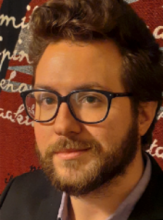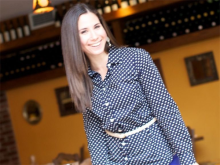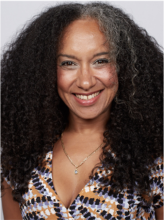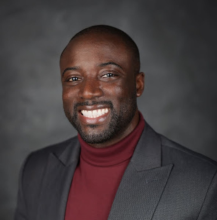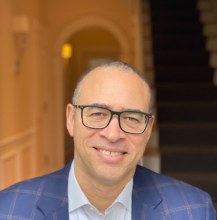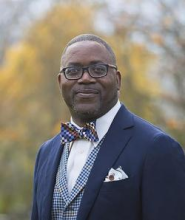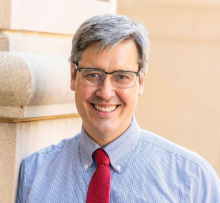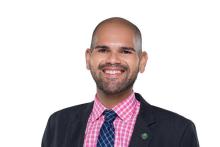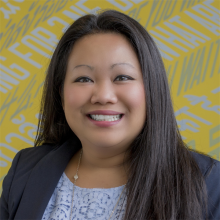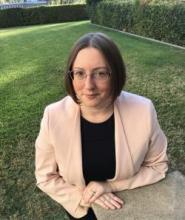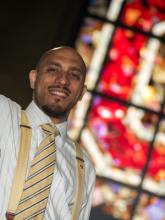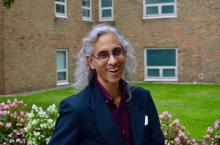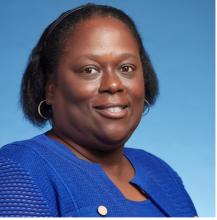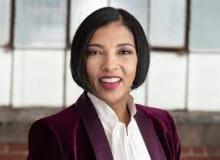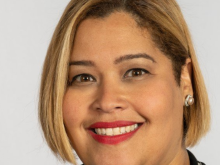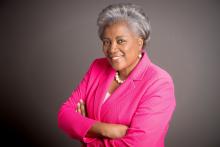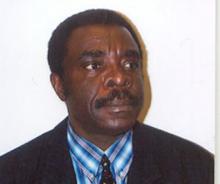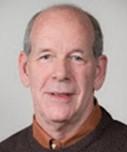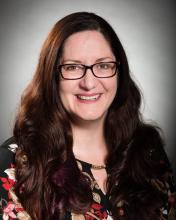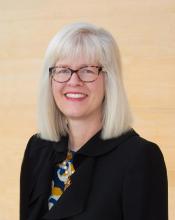The Office for Diversity, Equity and Inclusive Engagement sponsors the Power of Diversity Lecture Series to inspire campus dialogue, community engagement and civic education and learning about the national narrative on diversity and inclusion. Now in its 10th year, the series includes distinguished guest speakers from the national or international scene and scholars from our own faculty.
The speakers include scholars, thought leaders and diversity professionals whose research, scholarship, leadership and advocacy enhance the university's efforts to present diverse ideas, perspectives and viewpoints to inspire greater understanding and appreciation for inclusive excellence.
All events are free and open to the public.
For more information contact Office for Diversity, Equity and Inclusive Engagement.
2024 Speakers
Religious Pluralism: Bridging the Campus Divide
Todd Green is the Senior Director of Campus Partnerships at Interfaith America. Prior to joining Interfaith America, Todd served as a religious studies professor at Luther College. He has advised a number of federal government agencies, including the White House, the State Departement and the Department of Education on how to address religious bigotry and promote interfaith cooperation. His perspectives have been featured in a variety of media outlets, including The New York Times, The Washington Post, CNN and NPR. He holds a BA from Birmingham-Southern College, an MDiv from Columbia Theological Seminary, and an MA and PhD from Vanderbilt University.
Building Bridges Across A Divided America
Robert L. Solomon, Esq., is vice president for the Office for Diversity, Equity and Inclusive Engagement. Solomon is a President Emeritus of 100 Black Men of Central Ohio and is a Board Chair Emeritus of the Africentric Personal Development Shop. His past honors have included being appointed by former Ohio Governor Ted Strickland to serve on the Ohio Ethics Commission in 2010, selected by Congress to represent the District at the 2006 National African American Leadership Summit in Washington, D.C., recipient of the National Hispanic Bar Association Region X President’s Award (2015) and the George V. Voinovich Public Service Award from The Ohio State University Moritz College of Law (2016).
Muslim/Arab Identity and Islamophobia
Dr. Homayra Ziad is Director of Campus Partnerships at Interfaith America and a longstanding interfaith practitioner and educator. After receiving her doctorate in Islamic Studies at Yale University, Homayra served as Assistant Professor of Islam at Trinity College in Hartford and then Scholar of Islam at the Institute for Islamic, Christian and Jewish Studies, a Baltimore interfaith organization. Most recently, she was Senior Lecturer in Islamic Studies and a community-engaged teaching fellow at Johns Hopkins University, receiving JHU’s teaching award and supporting religious and other diversity efforts on campus. Homayra also served as Board President of the ACLU of Maryland. For two decades, she has co-created projects that connect religion with the arts, public health, and mental health and supported educators, activists, artists and religious leaders in navigating pluralism and fostering networks of social change. She was founding co-chair of the American Academy of Religion’s Interreligious and Interfaith Studies Group and is co-editor of Words to Live By: Sacred Sources for Interreligious Engagement (Orbis Press, 2018). Homayra writes for academic and popular venues, and consults for film and media.
Jewish Identity and Anti Semitism
Sept. 20, 2024
Chad Alan Goldberg is Martindale-Bascom Professor of Sociology and a faculty affiliate of the Department of History (by courtesy) and the George L. Mosse/Laurence A. Weinstein Center for Jewish Studies at the University of Wisconsin–Madison. He has written since 2008 about the history and sociology of antisemitism, he teaches a course on the history of antisemitism in Europe, and he works to educate the public about antisemitism through interviews for news media. His award-winning books include Citizens and Paupers: Relief, Rights, and Race, from the Freedmen’s Bureau to Workfare (University of Chicago Press, 2008); Modernity and the Jews in Western Social Thought (University of Chicago Press, 2017); and (as editor) Education for Democracy: Renewing the Wisconsin Idea (University of Wisconsin Press, 2020). He has been a member of the Academic Engagement Network since 2016.
Understanding The Middle East Conflicts from a Diplomat’s View
Sept. 17, 2024
Ambassador Dennis Ross is the counselor and William Davidson Distinguished Fellow at The
Washington Institute for Near East Policy. He also teaches at Georgetown University’s Center
for Jewish Civilization. For more than twelve years, Amb. Ross played a leading role in shaping
U.S. involvement in the Middle East peace process, dealing directly with the parties as the U.S.
point man on the peace process in both the George H. W. Bush and Bill Clinton administrations.
He served two and half years as special assistant to President Obama and National Security
Council senior director for the Central Region, spending the first 6 months of the Administration
as the special advisor on Iran to Secretary of State Hillary Rodham Clinton.
Prior to his service as special Middle East coordinator under President Clinton, Amb. Ross
served as director of the State Department’s Policy Planning Staff in the first Bush
administration. He played a prominent role in U.S. policy towards the former Soviet Union, the
unification of Germany and its integration into NATO, arms control negotiations, and the 1991
Gulf War coalition. During the Reagan administration, he served as director of Near East and
South Asian affairs on the National Security Council staff and deputy director of the Pentagon’s
Office of Net Assessment.
Panel: Life through Mixed-Income Communities: Reality Check from Residents and Practitioners
March 22, 2024
There is now conclusive evidence that diverse neighborhoods lead to more economic mobility than segregated neighborhoods (Harvard University Opportunity Insights). But how do we create diverse neighborhoods in cities as segregated as Cleveland? One policy approach is intentionally mixed-income housing and communities. Cleveland won a $35 million federal Choice Neighborhoods Initiative grant in 2021 to transform the Woodhill Homes public housing estates into a mixed-income community. Case Western Reserve University is the lead anchor institution for the initiative. The first new mixed-income building, Woodhill Station West, will open in February 2024. Come hear residents and practitioners discuss their aspirations for the building and the challenges that they are facing to make an inclusive, equitable community come to life.
Speaker: Spencer Paysinger
Feb. 23, 2024
A Super Bowl-champion linebacker turned Hollywood writer/producer, Spencer Paysinger brought his own poignant story of living in South Central LA and playing football at Beverly Hills High to the hit CW and Netflix series, All American.
2023 Speakers
Speaker: John Bickers
Nov. 10, 2023
John Bickers is an assistant professor of history at Case Western Reserve University and a citizen of the Miami Tribe of Oklahoma. He specializes in early American and Native American history. His research focuses on Indigenous constructions of citizenship and race, as well as theories of Native political sovereignty and governance. His first book project—tentatively titled The Miami Nation: A Middle Path for Indigenous Nationhood—is an exploration of the political history of the Miami Tribe through the nineteenth and early twentieth centuries, in which he argues for Indigenous forms of nation-building based on traditional political ideology rather than Euro-American concepts of governance.
Speaker: Keri November
Oct. 20, 2023
Keri November received her Master of Arts degree in teaching American Sign Language as a Foreign Language and Curriculum Design from Columbia University in 2008. She received her Bachelor of Science in Education from New York University in 2006.
November is actively involved in the Deaf community, attends ASL workshops, ASL events and gives lectures throughout the United States. She is also the co-founder of Tremont Brainery.
November’s personal and professional goal is to foster understanding and communication between hearing and Deaf individuals both culturally and through ASL as a foreign language.
Hispanic Heritage Month: Claudia Cruz
Oct. 5, 2023
Claudia Cruz is an award-winning editor and reporter and the current director of internships and managing editor of Noticiero Móvil at the Reynolds School of Journalism at the University of Nevada, Reno. Formerly, she was a technology reporter for CNET en Español and served as the local editor of Mountain View Patch. Cruz was editor of El Correo de Queens and freelancer for The Manhattan Times, and is a past president of the Bay Area chapter of the National Association of Hispanic Journalists. Cruz received her M.A. from the Craig Newmark Graduate School of Journalism at CUNY, a J.D. from The Ohio State University and a B.A. in Government and Latin American Studies from Wesleyan University.Panel Discussion: What is Next with Diversity, Equity & Inclusion in Higher Education
Sept. 20, 2023
A panel discussion featuring Case Western Reserve's Robert L. Solomon, Esq., vice president for diversity, equity and inclusive engagement; Cleveland State University's Phillip "Flapp" Cockrell, PhD, vice president for campus engagement, diversity, equity and inclusion; and Baldwin Wallace University's Randi Congleton, PhD, chief diversity and inclusion officer.
Speaker: Kwame Christian
April 19, 2023
Kwame Christian is the founder and CEO of the American Negotiation Institute, and the host of the world’s most popular negotiation podcast, Negotiate Anything, which has over eight million downloads and listeners in +180 countries. Christian’s career took off after his popular TEDx Talk, Finding Confidence in Conflict. This led him to write two best-selling books—Finding Confidence in Conflict and How to Have Difficult Conversations About Race. Christian was the recipient of the John Glenn College of Public Affairs Young Alumni Achievement Award in 2020, The Ohio State University Moritz College of Law Outstanding Recent Alumni Award in 2021 and the 2022 Columbus 40 Under 40 Award. Christian’s proudest achievement is his family.
Christian was also ranked in the 99th percentile of Chess.com’s over 20 million active players, led The Ohio State University’s Tennis Club Team to the national tournament and has the best ‘dad jokes’.
Speaker: Jonathan Holloway
THE POLITICS OF THE PAST: CITIZENSHIP AND RACIAL CLAIMS TO TRUTH IN A SOCIALLY MEDIATED AGE
March 8, 2023
Jonathan Holloway, who was appointed the 21st president of Rutgers in 2020, is an eminent historian specializing in post-emancipation United States history with a focus on social and intellectual history. Holloway is the author of several books—the latest being The Cause of Freedom: A Concise History of African Americans, which was published last year.
Prior to accepting the presidency of Rutgers, Holloway was provost of Northwestern University from 2017-2020, and a member of the faculty of Yale University from 1999-2017. At Yale, Holloway served as Dean of Yale College and the Edmund S. Morgan Professor of African American Studies, History and American Studies.
Holloway earned his Bachelor’s degree with honors in American Studies from Stanford University and a PhD in history from Yale University. He serves on several boards, including the Andrew W. Mellon Foundation, the American Academy of Arts & Sciences, the Gates Cambridge Trust and the Smithsonian's National Museum of African American History and Culture. He is also a Fellow of the Council on Foreign Relations.
Black Girl Magic in Health Care Panelists: Angelique Redus-McCoy, Constance Hill-Johnson, Erika Pritchett, Jazmin Long, Naomi Drakeford
A PANEL DISCUSSION FEATURING AND CELEBRATING BLACK WOMEN WHO ARE CONTRIBUTING TO HEALTH CARE IN GREATER CLEVELAND
February 8, 2023
2022 Speakers
Speaker: Bryan Adamson
THE 'BLURRED LINES' OF MARVIN GAYE'S "HERE, MY DEAR": MUSIC AS A COMMUNICATION TORT, DIVORCE NARRATIVE AND THE PERFORMANCE OF MASCULINITY
November 16, 2022
Professor Adamson is the David L. & Ann Brennan Professor of Law, and Associate Dean of Diversity and Inclusion. His areas of expertise are mass media and First Amendment law, and he has practiced extensively in re-entry advocacy, housing, mortgage lending and consumer protection.
Adamson’s talk explored the legal dimensions of that threat, and whether Here, My Dear conforms to or confounds frameworks which inform the performance of masculinity.
Speaker: Daniel P. Tokaji
DIVERSITY AND DEMOCRACY
October 19, 2022
Tokaji is the Fred W. & Vi Miller Dean and Professor of Law at the University of Wisconsin Law School. As Dean, he serves as the chief academic and executive officer of the school, with responsibility for faculty and staff development, personnel oversight, strategic planning and institutional vision, fundraising, budget planning and management, curriculum, and student academic affairs
Tokaji became Dean of the University of Wisconsin Law School in 2020. From 2003 to 2020, he was on the faculty at Ohio State University, where he served as Associate Dean for Faculty and Charles W. Ebersold & Florence Whitcomb Ebersold Professor of Constitutional Law. He has taught a wide variety of courses, including Civil Procedure, Civil Rights Lawyering, Comparative Constitutional Law, Election Law and Voting Rights, Federal Courts, First Amendment, Legal Analysis and Writing, Legislation and Regulation, and the U.S. Legal System. He has also taught at Harvard Law School, Hong Kong University, and Oxford University.
Speaker: Ángel L. Reyes-Rodríguez
NURTURE EQUITY TO DIVERSIFY ACADEMIA
September 14, 2022
Dr. Ángel L. Reyes-Rodríguez was born in Guayama, Puerto Rico. Before moving to the mainland to train at Case Western Reserve University, he obtained a bachelor’s degree in Biology from the University of Puerto Rico in San Juan. Once at the university, he first participated in the Postbaccalaureate Research Education Program (PREP) and then became a graduate student. His doctoral work focused on studying how Human Immunodeficiency Virus, HIV, spreads through routine immune-cell interactions. He graduated in 2015 with a doctoral degree in Molecular Virology. Following graduation, Dr. Reyes-Rodriguez had a postdoctoral fellowship in the Department of Neurosciences through the Lerner Research Institute at Cleveland Clinic. His projects related to immune responses to coronavirus infection of the Central Nervous System.
Dr. Reyes-Rodriguez now devotes his time to bringing equity to higher education. He is the director of the McNair Scholars Program at Cleveland State University. The McNair Scholars Program works with underserved yet smart, talented, and hardworking students, making them competitive graduate school applicants and successful graduate students. Dr. Reyes-Rodriguez’s role is to provide these students with a mentorship program, research internships, career development programming, and other services. Program alums enroll in master’s and PhD programs.
Dr. Reyes-Rodriguez has been working on supporting equity efforts in graduate education from different roles for almost 15 years. He worked to provide minoritized graduate students at Case Western Reserve with career development and networking opportunities while president of the Minority Graduate Student Organization. He also worked on advocacy, communication and networking projects for the Lerner Postdoctoral Association at Cleveland Clinic. At Cleveland State, Ángel works on equity initiatives designed to remove systemic barriers faced by minoritized students in higher education. As a result, he was one of Crain’s Cleveland Business "Forty Under 40" honorees in November 2021. His passion for bringing equity to higher education has led him to give talks and lead workshops locally and nationally.
Watch Ángel L. Reyes-Rodríguez
Speaker: Naomi Sigg
THE MODEL MINORITY MYTH
May 4, 2022
The rise in anti-Asian violence and hate has left many Asian, Pacific Islander, South Asian, and Asian American students feeling fearful, isolated, and further marginalized. Many institutions of higher education are committed to the success of all diverse student populations, but sometimes fall short of supporting the APIDA student communities which can lead to reports of low satisfaction rates as well as a dip in affinity when students become alumni. This presentation will address the current context of racism, hate, and bias faced by students, provide a historical background of racism toward these communities, as well as identify opportunities to stand in solidarity with the Asian, Pacific Islander, South Asian, and Asian American students in ways that are meaningful, intentional, and equitable.
2022 Speaker: Angela Clark-Taylor
THE FEMINIZATION OF THE HIGHER EDUCATION: IMPLICATIONS FOR CREATING A SUPPORTIVE ENVIRONMENT FOR WOMEN STAFF
April 13, 2022
Non-instructional staff are over 60% of the higher education workforce, they are also predominantly women at 60% and women of color at 31%. This lecture will consider implications from a national study on women-aligned staff in higher education that explores experiences of women staff with campus climate, personal and workplace trauma, career satisfaction, and professional development.
Angela Clark-Taylor, PhD is the executive director of the Flora Stone Mather Center for women. Clark-Taylor has 17 years’ experience in higher education with significant experience as a staff member as well as providing professional development and coaching to women staff. Her work is driven by her commitment to higher education as a public good. By focusing on how intersecting social identities control educational and professional opportunities, her scholarship seeks to understand how the structure of higher education can limit or advance equity and inclusion. Clark-Taylor’s current projects utilize critical constructivist frameworks to illuminate how both historic and contemporary cultures and climates have created educational (in)equities.
2022 National Speaker: Hasan Kwame Jeffries
Feb. 23, 2022
Author and educator Dr. Hasan Kwame Jeffries discussed "Making Sense of the Moment: Race, Politics and Democracy" in his National Power of Diversity Lecture. He is the author of Bloody Lowndes: Civil Rights and Black Power in Alabama’s Black Belt, which tells the remarkable story of the African American freedom movement in Lowndes County, Alabama, the birthplace of Black Power. He is also the editor of Understanding and Teaching the Civil Rights Movement, a collection of essays by leading civil rights scholars and teachers that explores how to teach the Civil Rights Movement accurately and effectively. Hasan’s current book project, In the Shadow of Civil Rights, examines the Black experience in New York City from 1977 to 1993.
Jeffries consults regularly with school districts on developing anti-racism programming. This work includes conducting professional development workshops for teachers, speaking to student assemblies, and developing inclusive curricular centered on social studies.
In the classroom, Jeffries takes great pride in opening students’ minds to new ways of understanding the past and the present. This has led him to push the very boundaries of what we think of as a classroom, including taking small groups of undergraduates to James Madison’s Montpelier, the Virginia plantation home of the nation’s fourth president, to explore the history of race and racism in America from slavery through the present. For his pedagogical creativity and effectiveness, he has received Ohio State’s Alumni Award for Distinguished Teaching, the university’s highest award for teaching, and The Ohio State University College of Arts and Sciences Outstanding Teaching Award.
Watch Dr. Jeffries' presentation
2021 Speakers
Dismantling Colonial Categories at Case Western Reserve University
Dec. 1, 2021
Speaker: Deepak Sarma, PhD
What colonial complexities and categories persist at Case Western Reserve University that reinforce or permit institutional, structural, and systemic racism? In his talk Sarma challenged the Case Western Reserve community to confront time-honored taxonomies that often remain hidden behind gestural subversions, cultural posturing, and performative diversity agendas. Is decolonizing Case possible? Desirable? Or dangerous? Or is it impossible, in this case?
Dr. Deepak Sarma, professor of Indian religions and philosophy at Case Western Reserve University, is the author of Classical Indian Philosophy: A Reader (2011), Hinduism: A Reader (2008), Epistemologies and the Limitations of Philosophical Inquiry: Doctrine in Madhva Vedanta (2005) and An Introduction to Madhva Vedanta (2003).
He was a guest curator of Indian Kalighat Paintings, an exhibition at the Cleveland Museum of Art. He is a curatorial consultant for the Department of Asian Art of the Cleveland Museum of Art.
After earning a BA in religion from Reed College, Sarma attended the University of Chicago Divinity School, where he received a PhD in the philosophy of religions. His current reflections concern cultural theory, racism, and post-colonialism.
Structural racism and its impact on mental healthcare
Nov. 4, 2021
Speaker: Cheryl Wills, MD
In her November 2021 lecture, Dr. Wills discussed structural racism and its impact on mental healthcare.
Cheryl D. Wills, MD, DFAPA, is director of Child and Adolescent Forensic Psychiatric Services at University Hospitals of Cleveland and associate professor of Psychiatry at Case Western Reserve University. Her interests include occupational, community and correctional psychiatry.
Dr. Wills serves on the APA Board of Trustees and chaired its APA Presidential Task Force on Structural Racism. She has coauthored treatment guidelines with the APA Guideline Writing Group, is actively involved in the American Academy of Psychiatry and the Law and serves on the editorial board of the Journal of the American Academy of Psychiatry and the Law. Her publications focus on forensic and clinical aspects of psychiatric practice.
Dr. Wills teaches locally and nationally on matters pertaining to mental health and law. Her skillset makes her an effective advocate the profession and an effective consultant to healthcare professionals, businesses, attorneys, medical boards, and legislators.
The Work of Dismantling Institutional Racism in Higher Education
Oct. 20, 2021
Speaker: Katrice Albert, PhD
Over the past two years, there has been a significant increase in the commitment and interest in advancing diversity, equity and inclusion initiatives. Institutions across industry, government and higher education have been seeking antiracist policies and practices all focused on creating more inclusive spaces and environments for all. However, there are systems that exist within all of these institutions that consistently yield inequitable outcomes, despite the commitment and sincerity of their leaders and communities. Dr. Albert will share her expertise and wisdom to help us think more critically about how we can implement inclusive strategies to create systems that are more likely to yield inclusive outcomes.
Dr. Katrice A. Albert is a passionate global thought leader who has masterfully interwoven the areas of inclusive excellence, higher education, intercollegiate athletics, race relations, culture and engagement with a penchant for people-centered talent management and mission-driven visionary leadership. With more than 25 years of purpose-propelled experience, she is a champion for access and opportunity and provides transformational business solutions, sustainable equity and inclusion strategies, and culturally-responsive leadership development services steeped in a focus on diverse top talent and the communities they serve.
Albert has a distinguished career in higher education and intercollegiate athletics. Most recently, she was appointed as the new Vice President for Institutional Diversity for University of Kentucky. In past years, Dr. Albert also served as the Executive Vice President of Inclusion and Human Resources at The National Collegiate Athletic Association (NCAA). Prior to that role, Albert served as Vice President for Equity and Diversity of the University of Minnesota system, as well as Vice Provost for Equity, Diversity and Community outreach at Louisiana State University (LSU). Dr. Albert is the author of Racial Battle Fatigue in Higher Education: Exposing the Myth of Post-Racial America (2015) and Trayvon Martin, Race, and American Justice: Writing Wrong (2014).
Hispanic Heritage Month Event
Sept. 28, 2021
Speaker: Teresa Molina, JD
The Honorable Teresa Molina shared her journey as a Latina, growing up in Cleveland, Ohio, navigating systemic and structural racism, while earning a Juris Doctorate.
Judge Molina earned her law degree at The Ohio State University College of Law, and has dedicated her entire career to public service. Judge Molina worked for over 18 years as an attorney and has spent the past two years as a judge serving Cook County Circuit Court in Illinois. Judge Molina is the first Puerto Rican ever to be appointed and elected to a countywide judicial vacancy in Cook County and has presided over bench trials, statutory summary suspension hearings, and motions regarding the admissibility of evidence in cases.
Watch the presentation from Teresa Molina
2021 National Speaker: Donna Brazile
Tuesday, Feb. 9, 2021
Political strategist, author and lecturer Donna Brazile presented a virtual lecture to the CWRU campus on Tuesday, Feb. 9. She discussed the increase in the number of women in Congress and their potential impact on politics. Her lecture was part of the events being held on campus to celebrate Black History Month.
Brazile is the former chair of the Democratic National Committee and former news contributor for FoxNews, ABC News and CNN. She is the author of the 2004 best-selling memoir Cooking with Grease: Stirring the Pot in American Politics and co-author of For Colored Girls Who Have Considered Politics. In addition, she is an adjunct professor at Georgetown University and Howard University.
Brazile has received numerous honors and awards including the W.E.B Du Bois Medal, Harvard University’s highest honor in African American Studies; and the Congressional Black Caucus Foundation’s highest award for political achievement.
Ethnicity and Nation-Building in Francophone Africa
Thursday, Feb. 18, 2021
Speaker: Gilbert Doho, PhD
Gilbert Doho, PhD, is associate professor of French and Francophone Studies and founding director of the Ethnics Studies Program in the CWRU Department of Modern Languages and Literatures. His research area includes drama, theater and cinema in Francophone Africa. His secondary research area is culture and ethnicity. Doho endeavors to show how print and audiovisual productions have shaped and continue to shape individuals and ethnic groups in new nations of Francophone Africa.
He has contributed entries to dictionaries and encyclopedia such as The Dictionary of African Biography, co-edited by Henry Louis Gates; and the World Encyclopedia of Contemporary Theater, Vol. 3: Africa. His scholarly work has been published in such journals as Africa Today, Journal of African Literature Association and Signs.
Watch Professor Doho's lecture.
How to Approach Racism as a Public Health Crisis: Lessons in Healing from the Biology of Wound Repair
Wednesday, Feb. 24, 2021
Speaker
Scott Frank, MD, MS, is associate professor in the Department of Population and Quantitative Health Sciences and in the Department of Family Medicine and Community Health in the CWRU School of Medicine, where he directs the Master of Public Health Program.
Frank is a public health and family medicine educator, researcher and practitioner. His research interests include behavior change, smoking cessation, substance abuse, clinical assessment of stress and the role of spirituality and religion in the medical setting.
Frank has authored and co-authored numerous scholarly articles. He is a member of several national and local organizations, including the Association of Ohio Health Commissioners and the Ohio Public Health Association; and he is on the executive board of the Association for Prevention Teaching and Research and on the board of the Greater Cleveland Hospital Association.
Diversity in Academia: Challenges in the Era of COVID-19
Thursday, March 18, 2021
Speaker: Amy Hise, MD
Amy Hise, MD, is associate professor of Pathology and International Health at Case Western Reserve University and a physician at the Louis Stokes Cleveland VA Medical Center. Her research focuses on innate immunity to infectious pathogens including parasites, fungal infections and the Rift Valley fever virus.
Hise has been active in promoting diversity and inclusion within the CWRU School of Medicine (SOM) and on university and national committees. She is a member and past president of the Women Faculty School of Medicine committee, chair of the SOM Committee on Women and Minority Faculty and a member of the dean’s Ad-hoc Committee on Diversity and Inclusion. She also serves on the university’s Faculty Senate Committee on Women and on the Gender Diversity Task Force of the American Medical Women’s Association (AMWA). In fall 2020, Hise received AMWA’s Exceptional Mentor Award.
She is the co-author of “Empowering Women: Moving from Awareness to Action at the Immunology of Fungal Infections Gordon Research Conference,” which appeared in Pathogens in 2019.
Exploring Social Determinants of Health Within the CWRU Wellness Program
Monday, April 12, 2021
Speaker: Elizabeth Click, DNP, ND
Elizabeth Click, DNP, ND, is the medical director and associate professor in the Frances Payne Bolton School of Nursing. She creates and directs the university’s faculty and staff wellness program and provides strategic support for the implementation of health initiatives within the university’s medical plan.
Her professional pursuits focus on wellness and behavior change efforts for individuals and groups within academic and corporate organizations. She also works with individuals and groups to support their present level of health and help them reach higher levels of wellness.
Click is also a certified wellness practitioner. She previously served as manager of wellness training at The Progressive Corporation in Cleveland.




